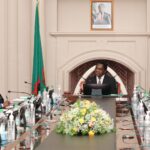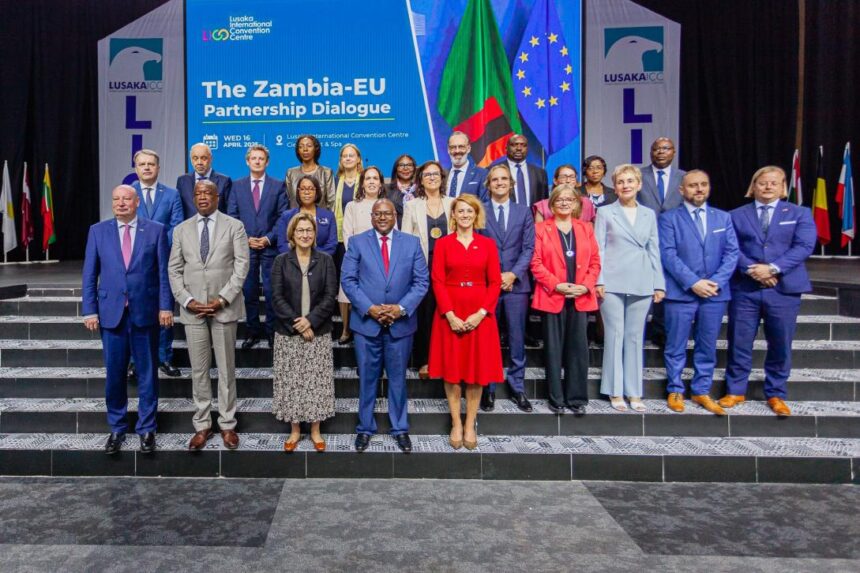On 16 April 2025, Lusaka played host to the annual Partnership Dialogue between the European Union (EU) and the Republic of Zambia, a key meeting aimed at deepening bilateral relations and fostering collaboration on global and regional challenges. The dialogue was co-chaired by Ms. Rita Laranjinha, Managing Director for Africa of the European External Action Service, and Hon. Mulambo Haimbe, MP, Minister of Foreign Affairs and International Cooperation of Zambia.
This year’s dialogue marked a significant milestone, with both sides commemorating 50 years of diplomatic relations between the EU and Zambia and the 25th anniversary of the partnership between the EU and the African Union. The meeting brought together Heads of Mission from EU member states including the Czech Republic, Finland, France, Germany, Hungary, Ireland, Italy, and Sweden, alongside non-resident diplomats from Belgium, Bulgaria, Denmark, Poland, and Spain. Henrik Hololei, Hors-Classe Adviser from the European Commission Directorate-General for International Partnerships, also participated in the discussions.
A Natural Partnership
The opening remarks by Ms. Laranjinha highlighted the importance of the EU-Zambia partnership, emphasizing that Africa remains a high priority for the EU. “In the current geopolitical context, partnerships grounded in shared values and interests are more important than ever,” she said. She further described Zambia as a “natural partner” to the EU, with both parties committed to democratic governance, peace, security, and sustainable development. These shared values underscore the strength and relevance of the EU-Zambia partnership.
Expanding Dialogue Across Key Issues
The Partnership Dialogue covered a wide range of issues that are crucial to both Zambia and the EU. One of the main topics of discussion was the evolving geopolitical landscape and the shared commitment to addressing global challenges such as peace, security, climate change, and environmental protection. The dialogue also centered on multilateralism and the ongoing reforms of international institutions.
A major portion of the discussions was dedicated to governance, human rights, legislative reforms, and electoral processes, with both sides underscoring the critical role of civil society in upholding democratic values. Regional security concerns were also high on the agenda, with the EU reaffirming its strong relationship with Southern Africa, including its recent collaboration with the Southern African Development Community (SADC) and continued support for COMESA, amounting to nearly EUR 100 million to enhance trade and regional integration.
Support for Zambia’s Economic Development
The dialogue also focused on Zambia’s business environment and the necessary reforms to foster foreign investment and support local entrepreneurship. The EU remains a key development partner for Zambia, with the EU and its member states collectively providing around EUR 140 million annually in grants. Through the Global Gateway Strategy, the EU aims to mobilize private sector investment and collaborate with European financial institutions to boost sustainable growth in Zambia.
Henrik Hololei explained that the Global Gateway initiative represents a shift in the EU’s strategic approach to partnerships, focusing on high-quality investments that promote local value addition, create jobs, and uphold the highest environmental, social, and governance standards. The EU’s support aims to benefit local communities while ensuring long-term, sustainable development.
Strategic Partnerships for a Green Transition
In addition to broader economic goals, the EU and Zambia have also concluded strategic partnerships in critical sectors such as raw materials, forestry, and infrastructure development. One of the notable initiatives is the development of the Lobito Corridor, which is expected to strengthen regional trade and connectivity. The EU’s investments in Zambia focus on key sectors such as energy, water, transport, education, and justice, with a strong emphasis on green transition and social resilience.
The EU is particularly focused on supporting Zambia’s transition to a greener economy, including the development of local value chains related to critical raw materials. Education and skills development are also integral to the EU’s strategy, as these efforts aim to build a workforce capable of driving future economic growth.
Looking Ahead: A Partnership for the Future
The Partnership Dialogue was a testament to the long-standing and growing relationship between the EU and Zambia. Both sides have reaffirmed their commitment to tackling global challenges and advancing sustainable development. As Zambia continues to implement reforms and strive for inclusive growth, the EU remains a steadfast partner, offering technical support, financial resources, and strategic investments.
With the continued collaboration between the EU and Zambia, both countries are poised to benefit from shared prosperity and a sustainable future. The dialogue on 16 April 2025 set the stage for further engagement, ensuring that the partnership between the EU and Zambia continues to thrive for many years to come.






